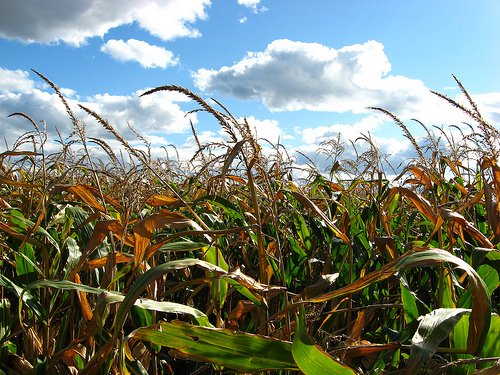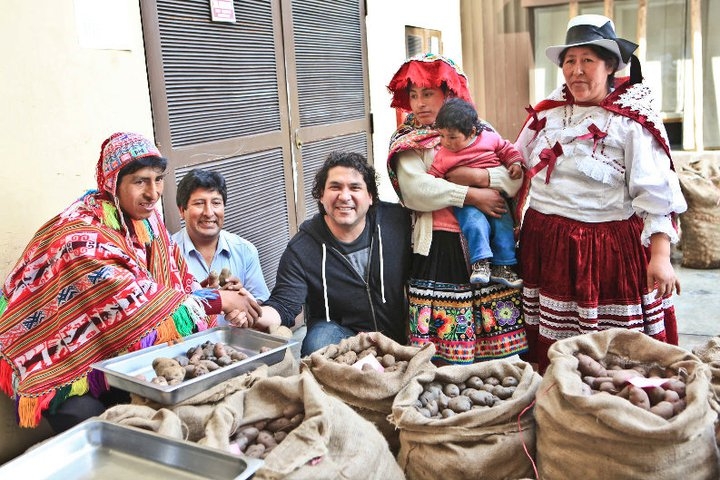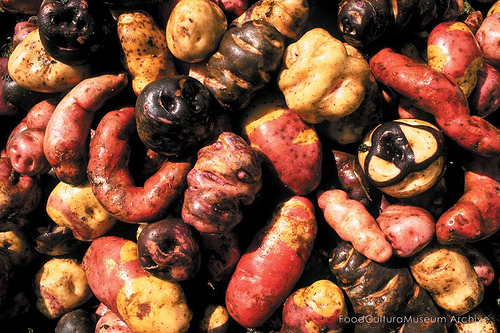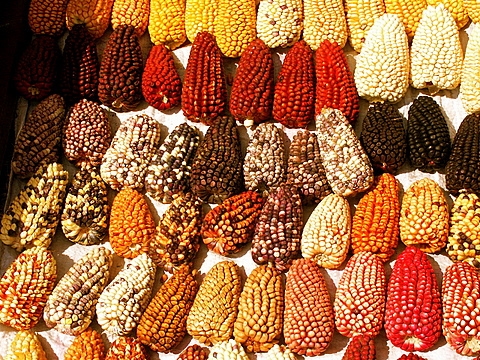This post is part of our special coverage Global Development 2011.

Corn is one of the most used genetically modified seeds worldwide (Photo: Peter Blanchard/FLickr, Licencia CC BY-SA 2.0)
[Note: All links in Spanish]
In Peru, the official signing of Decree 003 on April 15, which permits the import of genetically modified (GM) seeds into the country, continues to generate debate between those in favor of the widespread use of genetically modified organisms (GMOs) and those who fear it would be harmful to the country's biodiversity and the health of its people.
Despite some experts expressing their approval of GM seeds by claiming that the resistance and characteristics of the seeds will generate less agricultural waste, others are casting doubt over the supposed harmlessness of food produced from GM crops and are warning the public of the high probability that pollen from GM crops will cross-pollinate with wild and native crops, thus causing irreversible alterations to the traditional plant and fruit species which constitute part of the cultural and natural wealth of local communities.
The popular Peruvian chef, Gastón Acurio, is convinced that GM foods pose a threat to Peruvian biodiversity. Acurio drew attention to the alleged economic interests of the lobby groups who campaigned for the approval of Decree 003, and is now asking for “Peruvian interests to be prioritized and not those of [a few] individuals”.
The issue prompted the resignation of the former Minister for Agriculture, Rafael Quevedo, after he was revealed as a senior executive of a company which uses GM produce, as is highlighted by journalist Jackie Fowks in her blog Notas desde Lenovo.
Although Quevedo denied this claim, he was a staunch advocate of cultivating genetically modified crops in Peru. Moreover, one of his advisors, Alexander Grobman, owned companies which marketed GM seeds and has also just been dismissed by the incumbent minister, Jorge Villasante.

Chef Gastón Acurio poses with the Hancco family. The farming family grows 200 varieties of potato on their 5,000 m2 land. (Photo: Gastón Acurio Facebook Fan Page)
Meanwhile, the Minister for the Environment, Antonio Brack Egg, has reminded the country that some 65% of Peruvian agriculture depends upon the country's biodiversity, as exporting national produce and collecting tourism-generated funds raises over 8 billion dollars per year.
In Peru, the import of GM corn and soy is only permitted if the produce is to be used for feeding animals or if it is to be added to foods such as oil or soy milk.
It is calculated that each Peruvian consumes 63kg of GM corn each year. The fact that Peruvian laws still do not regulate what information is provided on food labels regarding whether or not food contains genetically modified produce represents an additional problem.
Several regional organizations are demanding a moratorium on Decree 003. According to the Minister for Agriculture, the proposed moratorium should last for five years, in order to foster greater public debate and thus inform Peruvians of all the implications associated with the planting and growing of GM seeds, with the aim of reaching a consensus on the issue.
The National Convention for Peruvian Agriculture, specialists, food experts and citizen organizations are not asking for a moratorium, but instead for the Decree's immediate repeal. Several local governments (Cajamarca, Huánuco, Cusco, Ayacucho, San Martín, Lambayeque and Lima Metropolitana) have even written ordinances proclaiming themselves “GM Free”, hoping to protect the different native varieties of potato and other local produce.

Native Potatoes. Peru grows some 3000 varieties of potato. (Photo: FoodCultura/Flickr, licencia CC BY-NC-ND 2.0)
In this same regard, the Presidency of the Council of Ministers has established that the Multisector Commission responsible for making proposals to Biosafety regulation should be established by the 1st of June 2011 at the latest and is aiming to release a report within no more than 30 days.
The debate gained greater significance in the public sphere when the famous chef, Gastón Acurio, became involved in the matter, which he has followed very closely on his Facebook wall:
No estamos en contra de los transgénicos. Estamos en contra de que las semillas transgénicas puedan contaminar nuestra agricultura y que sean los vendedores de estas semillas los que nos quieran imponer este camino a traves de normas que ellos mismos redactan. La agricultura peruana es y sera una potencia mundial.
Peruvian netizens have been playing an active role in the matter by campaigning from different perspectives. Toustodo's Blog highlights some of the risks that would result from establishing GM farming in Peru:
Sabemos lo que está detrás de todo esto, como también sabemos las consecuencias ambientales que acarrearía; no solo son los inmensos intereses financieros y económicos que se solapan tras un manto de progreso, más aún sabiendo que de implementarse esta tecnología el Perú sería arrastrado a la inopia más brutal cuando solo cuenta con el 3.81 % de suelos aptos para cultivos en limpio y 37 % de suelo forestal.
Toustodo continues:
Por lo tanto, existen dos alternativas. La primera talar bosques y convertir el área en suelos cultivables, aún a costa de que sabe que son forestales; las consecuencias ecológicas, ambientales y económicas serán desastrosas. Segundo, comprar las tierras de los pobres, generando con esto caos social, desempleo, penurias…
Francisco Estrada emphasizes that approving the use of GM seed will threaten small scale farmers:
…pasemos al punto más maligno del asunto (…) Las semillas transgénicas tienen una patente. Es decir que los campesinos están obligados a pagar por esa semilla cada vez que quieran cultivar.

The Quechua culture is considered to be responsible for domesticating some 150 varieties of corn. (Photo: whl.travel/Flickr, Licencia CC BY-NC-SA 2.0)
In her blog Kiwichita, Ana María Quispe highlights that due to posing a threat to traditional food and farming in villages, the spread of GM crops has become the cause of poverty, malnutrition and greater reliance on government assistance.
Alberto and Kathy from the blog Cada Plato Es Una Fiesta, directly accuse Monsanto – the company considered to be the largest producer of genetically modified seeds – and list the other environmental, sanitary and economic dangers presumed to be associated with the growing of such seeds.
In his blog, Antonio Velarde highlights the fact that amongst these presumed dangers, the risks to public health have not yet been studied:
En lo personal no consumiría estos productos sobre todo por precaución debido a que no estoy informado referente a los posibles efectos en la salud de las personas que consumen estos productos (…) es una vergüenza que viviendo en un territorio rico en recursos naturales y marinos nuestros gobernantes y los peruanos que están ligados a la agricultura, agropecuaria, pesca no sepan administrar estos recursos y lleguemos al extremo de importar productos de laboratorio que no estamos seguros de su peligrosidad.
Social networks are also involved in the issue. There are Facebook pages dedicated to the issue designed to directly oppose GM produce.
On Twitter, María Jiménez (@antitaurinahej) says:
No a los transgénicos en el Perú o sino que se los coma todos Alan Garcia [el Presidente] http://tinyurl.com/3ejf3t3
O.o recórcholis!! En Huaral (INIA) se estarían preparando parcelas para cultivo de transgénicos http://bit.ly/kmyVo1 NO #transgénicos #perú
Francisco Drakerm (@Drakerm) refers to the fact that the same problem is currently taking place in Chile:
PERU DILE NO A LOS TRANSGENICOS La guerra de las semillas transgénicas toma fuerza en Chile http://bbc.in/kdtqoL
The debate continues to fire up social networks in Peru and it is certain that there will be more news in June, when the Government commission responsible for the issue will begin revising and suggesting modifications to biosecurity regulation.
This post is part of our special coverage Global Development 2011.







3 comments